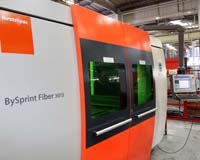22 October 2015
Fibre laser cutting cell works 24/7 but operator only works a single shift
 Over the last few years, Bisley has diversified its business and introduced a vast range of additional steel products for the office. Last autumn (2014) it expanded further by entering the industrial storage arena with new ranges of tool cabinets, cupboards and wall cabinets.
Over the last few years, Bisley has diversified its business and introduced a vast range of additional steel products for the office. Last autumn (2014) it expanded further by entering the industrial storage arena with new ranges of tool cabinets, cupboards and wall cabinets.
To support the increased production levels, at the end of last year the company installed its first fibre laser cutting machine, a Bystronic 3kW BySprint 3015 Fiber with ByTrans 3015 Extended automated sheet handling and storage. It joined two 5 kW CO2 laser cutters of a different make, installed over 10 years ago, and five turret punch presses at its factory in Newport, South Wales.
The Bystronic fibre laser cell operates 24/7 and is devoted to cutting mild steel sheet ranging in thickness from 0.7 to 1.2 mm as required by newly-formed Bisley Industrial Storage. Restricting the spread of gauges maximises the potential for lights-out running.
Office furniture production lines are also supplied with parts produced on the BySprint Fiber. However, on this side of the business the variety of gauges is greater. Some 40 per cent of throughput is 0.5 mm, rising to 2 mm for supports.
Paul Ostrolenk, Bisley’s technical director said, “The Bystronic fibre machine cuts thin-gauge steel faster than our CO2 lasers, despite having a laser source 40 per cent less powerful, and is now our main laser profiling resource.
“These days, it is difficult to see why anyone would buy a CO2 laser for cutting thin gauge material now that fibre laser technology has matured.
“As it is so fast, we decided to order a 12-shelf automated sheet storage system. It wastes little time presenting the next sheet to the working area and retrieving the skeleton, so production is virtually continuous.
“It was the build quality and simplicity of the automated sheet feeding that decided us in favour of the Bystronic solution, together with its ability to be fed with material manually like a normal machine when the need arises, unlike some other systems we looked at.”
The ByTrans holds 18 tonnes of mixed gauge steel, sufficient to keep the BySprint running for 45 hours - right over a weekend. So the single operator only works a normal day shift, entering programs and shaking components from each sheet after they have been cut. Meanwhile, the automated laser cell carries on producing 24 hours a day, seven days a week.
Payback on investment in the BySprint Fiber will therefore be rapid, especially as it consumes less power than a CO2 machine, does not need costly resonator gases and requires less maintenance. In Mr Ostrolenk’s opinion, a fibre laser is also more reliable in operation and there is greater consistency of cut across the sheet.
The Newport manufacturer operates a world class factory covering 41,000 square metres producing approximately 2,000 cabinets per week. Nearly £70 million has been spent on capital projects since 1997, including high speed blanking and forming lines, robotic welding, high speed powder paint plant and flat panel coating.
The company is a large user of cold rolled steel coil from Tata Steel and other suppliers. Around 24,000 tonnes are decoiled and converted into product annually, making Bisley the number one steel office furniture manufacturer in Europe. The privately owned company holds over 50 per cent market share in the UK and exports around half of production to 50 countries.
Only about one-fifth of the steel is processed through the three laser cutting machines. The remainder is turned into high-volume items like uprights and drawer bodies, of which 35,000 are made per week. They are produced from coil on press lines before passing to a panel bending machine or press brake. It is the more complex, low volume parts that are cut on the laser machines.
James Natoli, Sales & Marketing Manager of Bisley Industrial Storage added, “We are excited by the opportunities that our new industrial product range offers and are looking forward to presenting to a wider audience their many unique features.
“They include a fully welded rather than a riveted design, fast installation due to a reinforced welded base with adjustable feet or casters, drawers on telescopic ball bearing slides and slam-shut doors.
“The new laser cutting cell has the flexibility to produce our industrial products while volumes are building, the capacity to cope with larger quantities later on and the accuracy to ensure trouble-free assembly of the cabinets and cupboards.”
In addition, from August 2015 the company is introducing a range of products for the garage trade and automotive sector as well as a selection of work benches.
Again, in the early days the numbers will be relatively low. The automated fibre laser cell will provide quick, economical turnaround of small batches of components, helping Mr Natoli and his sales team to offer high quality items coupled with competitive prices.
- Contact Information
- Name: David Larcombe
- Email: david.larcombe@bystronic.com
- Website: www.bystronic.co.uk

